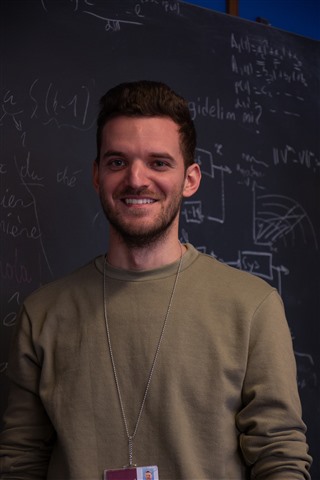Do you know a student who deserves to win this year? The winner will receive £500 and the chance to share their research in an IET webinar.
In 2022 this is just what Dr Andrei Braitor applied for, and won. Beside the £500 prize money, he had the chance to present his thesis to an international audience via an online guest lecture. This is scheduled for Thursday 20th April at 12 noon (BST) and you can register to hear about 'Advanced Hierarchical Control and Stability Analysis of DC Microgrids'.
The 2023 award launches in March, so keep an eye out if you want to apply.
 In a statement, Dr. Braitor said, “It is an honour for me to have been selected to receive the IET Control & Automation Doctoral Dissertation Prize 2022. I extend my sincere gratitude to the Institution of Engineering and Technology and the jury for recognising my work and awarding me this prestigious prize. It means so much that the work I am passionate about also resonates with others.
In a statement, Dr. Braitor said, “It is an honour for me to have been selected to receive the IET Control & Automation Doctoral Dissertation Prize 2022. I extend my sincere gratitude to the Institution of Engineering and Technology and the jury for recognising my work and awarding me this prestigious prize. It means so much that the work I am passionate about also resonates with others.
I am deeply humbled by this recognition and would like to express my appreciation for the support from my supervisor, Dr George Konstantopoulos. His guidance and encouragement have been invaluable, I would not have made it without his help.
My dissertation combines control design theory, theoretical analysis, and numerical and experimental validation with direct applications in microgrids and energy systems. I am proud of my contributions and grateful for the opportunity to share my findings with the wider academic community. I look forward to continuing my work in the control and automation field and contributing to advancing our understanding of such complex systems.
I am genuinely grateful for the recognition and support I have received, and I will strive to continue making meaningful contributions to our field. This recognition of my work can serve as an inspiration to others in the control and automation field.
Biography: Andrei-Constantin Braitor received a B.Eng. degree in Power Systems Engineering from Politehnica University of Timisoara, Romania, an M.Sc. degree in Energy and Power Systems from the University of Liverpool, U.K., and a PhD degree in Control and Power Systems from the University of Sheffield, U.K., in 2015, 2016 and 2021, respectively.
In June 2022, he joined the CentraleSupélec, Laboratoire des Signaux et Systèmes (L2S), Université Paris-Saclay, France, as a Research Associate. He previously occupied a similar position between 2021 - 2022 with the Department of Automatic Control and Systems Engineering, at the University of Sheffield, U.K. His main research interests are centred around nonlinear and networked systems, nonlinear control design and stability analysis, alongside distributed and optimal control with applications in microgrids and energy systems.
Here is a flavour of what Dr. Braitor will discuss at the webinar and you can sign up to register:
Advanced Hierarchical Control and Stability Analysis of DC Microgrids.
In this talk, the stability of meshed DC micro-grids with constant power loads (CPLs) is investigated under decentralised primary and distributed secondary control schemes to achieve accurate power sharing and voltage restoration, with the latter being more significant in the case of parallel converters in a micro-grid architecture.
The considered DC microgrid consists of multiple DC/DC boost converters, which have nonlinear dynamics, feeding local CPLs, which also exhibit a nonlinear behaviour and introduce negative impedance characteristics that are well-known to yield instability. At the primary control layer, the droop control concept is suitably formulated and implemented using the recently proposed state-limiting PI controller to accomplish an inherent current limitation for each converter and simultaneously facilitate the stability analysis.
Using limited information of the injected power from neighbouring converters and, depending on the micro-grid configuration, the load voltage, a distributed secondary controller is formulated to enhance the power sharing and accurately regulate the voltage to the rated value. By analysing for the first time both the dynamics of the converters with the CPLs and the two-layer control, singular perturbation theory is applied to prove the stability of the entire DC microgrid analytically. The scalability of the system is also ensured through relevant passivity analysis. Simulation and experimental tests are performed to confirm the effectiveness and validity of the proposed method.